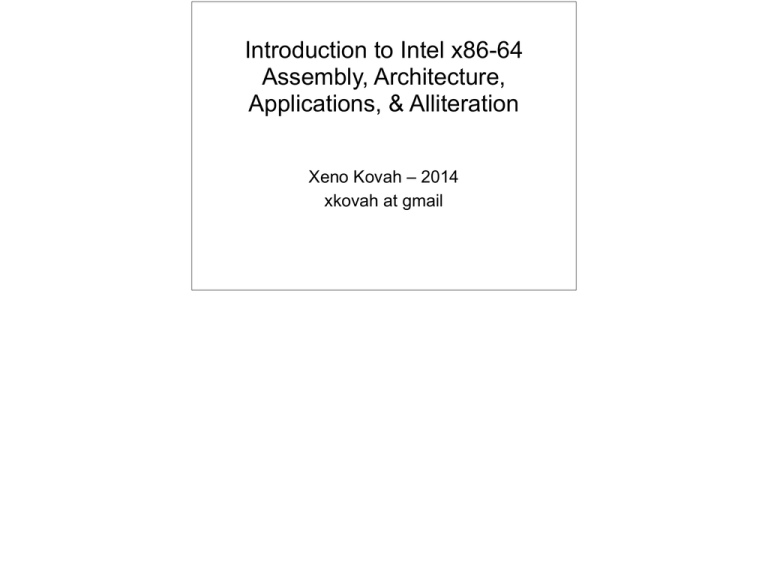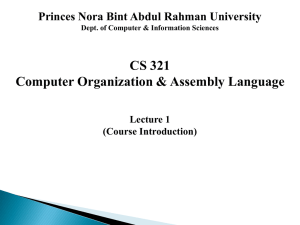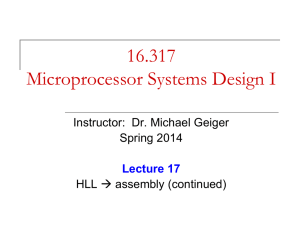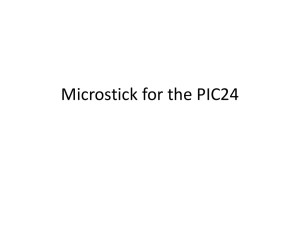Introduction to Intel x86-64 Assembly, Architecture, Applications
advertisement

Introduction to Intel x86-64
Assembly, Architecture,
Applications, & Alliteration
Xeno Kovah – 2014
xkovah at gmail
All materials is licensed under a Creative
Commons “Share Alike” license.
• http://creativecommons.org/licenses/by-sa/3.0/
Attribution condition: You must indicate that derivative work
"Is derived from Xeno Kovah's 'Intro x86-64’ class, available at http://OpenSecurityTraining.info/IntroX86-64.html”
Attribution condition: You must indicate that derivative work
"Is derived from Xeno Kovah's ‘Intro x86-64’ class, available at http://OpenSecurityTraining.info/IntroX86-64.html"
Pass1Parameter.c
Adding a single argument
//Pass1Parameter.c:
int func(int a){
int i = a;
return i;
}
int main(){
return func(0x11);
}
func:
0000000140001000
mov
dword ptr [rsp+8],ecx
0000000140001004
sub
rsp,18h
0000000140001008
mov
eax,dword ptr [rsp+20h]
000000014000100C
mov
dword ptr [rsp],eax
000000014000100F
mov
eax,dword ptr [rsp]
0000000140001012
add
0000000140001016
ret
rsp,18h
main:
0000000140001020
sub
rsp,28h
0000000140001024
mov
ecx,11h
0000000140001029
call
func (0140001000h)
000000014000102E
add
rsp,28h
0000000140001032
ret
The stack looks like this at line 000000014000100F in func():
00000000`0012FEB8
00000000`0012FEB0
00000000`0012FEA8
0x28 bytes
RSP
undef
undef
00000000`0012FEA0
undef
00000000`0012FE98
undef
00000000`0012FE90
arg1 = ecx = 0x11
00000000`0012FE88
return address = 000000014000102E
…
0x18 bytes
return address = 00000001400012FD
undef
00000000`0012FE78
undef
00000000`0012FE70
undef`0000BEEF
Huh? func() wrote
the register-passed
argument above
the return address?
Because the asm
only wrote a “dword
ptr” (4 bytes) worth
of memory at this
location, so the top
4 bytes are
undefined
Pass1Parameter.c takeaways
• Something very interesting is going on with the stack!
• The value which is passed in a register is then still being stored on
the stack…doesn’t that kind of defeat the speed benefit of passing
in registers?
//Pass1Parameter.c:
int func(int a){
int i = a;
return i;
}
int main(){
return func(0x11);
}
func:
0000000140001000
mov
dword ptr [rsp+8],ecx
0000000140001004
sub
rsp,18h
0000000140001008
mov
eax,dword ptr [rsp+20h]
000000014000100C
mov
dword ptr [rsp],eax
000000014000100F
mov
eax,dword ptr [rsp]
0000000140001012
add
rsp,18h
0000000140001016
ret
main:
0000000140001020
sub
rsp,28h
0000000140001024
mov
ecx,11h
0000000140001029
call
func (0140001000h)
000000014000102E
add
rsp,28h
0000000140001032
ret
SpecialMaths.c
With command line arguments, 2 function parameters, and special
maths known to generate particular asm as a teachable moment :)
#include <stdlib.h>
int main(int argc, char ** argv){
int a;
//reminder: atoi() converts an ASCII string to an integer
a = atoi(argv[1]);
main:
return 2*argc + a;
0000000140001000 mov
qword
}
0000000140001005 mov
dword
ptr [rsp+10h],rdx
ptr [rsp+8],ecx
0000000140001009
sub
rsp,38h
000000014000100D
mov
eax,8
0000000140001012
imul
rax,rax,1
0000000140001016
mov
rcx,qword ptr [rsp+48h]
000000014000101B
mov
rcx,qword ptr [rcx+rax]
000000014000101F
call
qword ptr [400020F8h]
0000000140001025
mov
dword ptr [rsp+20h],eax
0000000140001029
mov
eax,dword ptr [rsp+20h]
000000014000102D
mov
ecx,dword ptr [rsp+40h]
0000000140001031
lea
eax,[rax+rcx*2]
0000000140001034
add
rsp,38h
0000000140001038
ret
Setting command line arguments
“r/mX” Addressing Forms
Reminder
• Anywhere you see an r/mX it means it could be taking a value
either from a register, or a memory address.
• I’m just calling these “r/mX forms” because anywhere you see “r/
mX” in the manual, the instruction can be a variation of the below
forms.
• In Intel syntax, most of the time square brackets [] means to treat
the value within as a memory address, and fetch the value at that
address (like dereferencing a pointer)
–
–
–
–
mov rax, rbx
mov rax, [rbx]
mov rax, [rbx+rcx*X] (X=1, 2, 4, 8)
mov rax, [rbx+rcx*X+Y] (Y= one byte, 0-255 or 4 bytes, 0-2^32-1)
• Most complicated form is: [base + index*scale + disp]
More info: Intel v2a, Section 2.1.5 page 2-4
in particular Tables 2-2 and 2-3
12
LEA - Load Effective Address
• Frequently used with pointer arithmetic,
sometimes for just arithmetic in general
• Uses the r/mX form but is the exception to
the rule that the square brackets [ ] syntax
means dereference (“value at”)
• Example: rbx = 0x2, rdx = 0x1000
– lea rax, [rdx+rbx*8+5]
– rax = 0x1015, not the value at 0x1015
!
Not covered in book!? It’s kind of important!
SpecialMaths.c takeaways
• When a compiler sees “special math” that can be computed in the
form “a + b*X + Y” (derived from the “r/mX” form, where X = {1, 2, 4,
8}, and Y = {0-2^32-1}), then it can compute the result faster if it
uses the LEA instruction, rather than a IMUL instruction for instance.
• More evidence that pass-by-register function arguments are being
stored onto the stack at some point (this time both ecx and rdx)
main:
#include <stdlib.h>
int main(int argc, char ** argv){
int a;
a = atoi(argv[1]);
return 2*argc + a;
}
0000000140001000
mov
qword ptr [rsp+10h],rdx
0000000140001005
mov
dword ptr [rsp+8],ecx
0000000140001009
sub
rsp,38h
000000014000100D
mov
eax,8
0000000140001012
imul
rax,rax,1
0000000140001016
mov
rcx,qword ptr [rsp+48h]
000000014000101B
mov
rcx,qword ptr [rcx+rax]
000000014000101F
call
qword ptr [400020F8h]
0000000140001025
mov
dword ptr [rsp+20h],eax
0000000140001029
mov
eax,dword ptr [rsp+20h]
000000014000102D
mov
ecx,dword ptr [rsp+40h]
0000000140001031
lea
eax,[rax+rcx*2]
0000000140001034
add
rsp,38h
0000000140001038
ret
TooManyParameters.c
func:
0000000140001000
mov
dword ptr [rsp+20h],r9d
Using more than 4 arguments, to force it to pass 0000000140001005 mov dword ptr [rsp+18h],r8d the extra parameters via the stack
000000014000100A mov dword ptr [rsp+10h],edx 000000014000100E
mov
dword ptr [rsp+8],ecx
0000000140001012
sub
rsp,18h
0000000140001016
mov
eax,dword ptr [rsp+28h]
000000014000101A
mov
ecx,dword ptr [rsp+20h]
000000014000101E
add
ecx,eax
0000000140001020
mov
eax,ecx
0000000140001022
//TooManyParameters:
0000000140001026
int func(int a, int b, int c, int d, int e){
000000014000102A
int i = a+b-c+d-e;
000000014000102E
0000000140001031
return i;
0000000140001034
}
0000000140001038
int main(){
main:
return func(0x11,0x22,0x33,0x44, 0x55); 0000000140001040
0000000140001044
}
sub
eax,dword ptr [rsp+30h]
add
eax,dword ptr [rsp+38h]
sub
eax,dword ptr [rsp+40h]
mov
dword ptr [rsp],eax
mov
eax,dword ptr [rsp]
add
rsp,18h
sub
rsp,38h
mov
dword ptr [rsp+20h],55h
000000014000104C
mov
r9d,44h
0000000140001052
mov
r8d,33h
0000000140001058
mov
edx,22h
000000014000105D
mov
ecx,11h
0000000140001062
call
0000000140001067
add
000000014000106B
ret
http://www.youtube.com/watch?v=Nr8r09c8ogg
ret
0000000140001000
rsp,38h
The stack looks like this at line 0000000140001031 in func():
00000000`0012FEB8
…
00000000`0012FEA8
00000000`0012FEA0
0x38 bytes
undef
undef
00000000`0012FE98
arg5 = 0x55
arg4 = r9 = 0x44
00000000`0012FE90
arg3 = r8 = 0x33
00000000`0012FE88
arg2 = edx = 0x22
00000000`0012FE80
arg1 = ecx = 0x11
00000000`0012FE78
return address = 0000000140001067
…
0x18 bytes
RSP
return address = 000000014000132D
00000000`0012FE78
00000000`0012FE70
undef
undef
undef`ffffffef
A pattern
emerges! Say
hello to the
Microsoft stack
“Shadow Space”!
Because the asm
only wrote a “dword
ptr” (4 bytes) worth
of memory at this
location, so the top
4 bytes are
undefined
Who knows what the first 4 parameters passed in registers
were when you’re trying to backtrace the stack calls?
“Shadow space” reference http://msdn.microsoft.com/en-us/library/zthk2dkh.aspx
http://ifanboy.com/wp-content/uploads/2011/10/The-Shadow-Alex-Ross-Cover-1.jpg
TooManyParameters.c takeaways
• Microsoft compiler specifically augments the
calling convention by not only passing the first 4
arguments through registers, but also still
reserving “shadow space” for them on the stack.
• “The callee has the responsibility of dumping the
register parameters into their shadow space if
needed.”
• Compiler reserves this space even if no function
parameters are passed to another function
//ExampleSubroutine4:
int func(int a, int b, int c, int d, int e){
int i = a+b-c+d-e;
return i;
}
int main(){
return func(0x11,0x22,0x33,0x44, 0x55);
}
func:
mov
dword ptr [rsp+20h],r9d
mov
dword ptr [rsp+18h],r8d
mov
dword ptr [rsp+10h],edx
mov
dword ptr [rsp+8],ecx
sub
rsp,18h
mov
eax,dword ptr [rsp+28h]
mov
ecx,dword ptr [rsp+20h]
add
ecx,eax
mov
eax,ecx
sub
eax,dword ptr [rsp+30h]
add
eax,dword ptr [rsp+38h]
sub
eax,dword ptr [rsp+40h]
mov
dword ptr [rsp],eax
mov
eax,dword ptr [rsp]
add
rsp,18h
sub
rsp,38h
mov
dword ptr [rsp+20h],55h
mov
r9d,44h
mov
r8d,33h
mov
edx,22h
mov
ecx,11h
ret
main:
call
add
0000000140001000
rsp,38h
ret
You can confirm that the typical sub rsp, 0x28 that you see is due to shadow space reservation by just changing func() to only take 4 parameters instead of
5, and seeing that it only reserves 0x28 again instead of 0x38 like seen here. But if you then add a local variable, which should technically fit in the
reserved stack space (just like this 5th parameter should have), it will again bump it up to 0x38. Still not sure what’s up with the over-allocation of stack
space in general (possibly just 0x10 alignment)…
Instructions we now know (12)
•
•
•
•
•
•
•
•
NOP
PUSH/POP
CALL/RET
MOV
ADD/SUB
IMUL
MOVZX/MOVSX
LEA
Back to Hello World
.text:0000000140001000
.text:0000000140001000
.text:0000000140001000
.text:0000000140001004
.text:000000014000100B
.text:0000000140001011
.text:0000000140001016
.text:000000014000101A
main
sub
lea
call
mov
add
retn
rsp, 28h
rcx, Format
; "Hello World!\n"
cs:__imp_printf
eax, 1234h
rsp, 28h
Are we all comfortable with this now?
(other than the fact that IDA hides the address of the string which is being calculated and replaces it
with “Format” for the format string being passed to printf?)
Windows Visual C++ 2012, /GS (buffer overflow protection) option turned off
Optimize for minimum size (/O1) turned on
Disassembled with IDA Pro 6.6 (with some omissions for fitting on screen)








